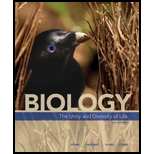
Biology: The Unity and Diversity of Life (MindTap Course List)
15th Edition
ISBN: 9781337408332
Author: Cecie Starr, Ralph Taggart, Christine Evers, Lisa Starr
Publisher: Cengage Learning
expand_more
expand_more
format_list_bulleted
Question
Chapter 31, Problem 6SQ
Summary Introduction
Introduction: Macronutrients like carbohydrates, fats, and proteins are the major three sources of energy. The carbohydrates provide energy for muscles and brain by breaking down into glucose. The carbohydrates constitute about 45-65% of energy (or calories); fats constitute 20-35% of energy; and protein constitutes about 10-20% of energy.
Expert Solution & Answer
Trending nowThis is a popular solution!

Students have asked these similar questions
please draw in and fill out the empty slots from image below.
thank you!
There is a species of eagle, which lives in a tropical forest in Brazil. The alula pattern of its wings is determined by a single autosomal gene with four alleles that exhibit an unknown hierarchy of dominance. Genetic testing shows that individuals 1-1, 11-4, 11-7, III-1, and III-4 are each homozygous.
How many possible genotypes among checkered eagles in the population?
what is this called?
Chapter 31 Solutions
Biology: The Unity and Diversity of Life (MindTap Course List)
Ch. 31 - Cultured Skin for Healing Wounds Diabetes is a...Ch. 31 - Cultured Skin for Healing Wounds Diabetes is a...Ch. 31 - Cultured Skin for Healing Wounds Diabetes is a...Ch. 31 - ___ tissues are sheetlike with one free surface....Ch. 31 - _______ keep fluid from leaking between cells. a....Ch. 31 - Exocrine glands are specialized ______ tissue. a....Ch. 31 - A rubbery secreted matrix or proteoglycans and...Ch. 31 - Blood cells develop from stem cells in ________....Ch. 31 - Prob. 6SQCh. 31 - Cytoplasmic extensions of _______ send and receive...
Ch. 31 - ______ muscle pulls on bones and _______ muscle...Ch. 31 - Straps or dense, regular connective tissue...Ch. 31 - ______ increase the surface area of some...Ch. 31 - Tears are an _______ secretion released by...Ch. 31 - Cancers most commonly arise in ______ tissue. a....Ch. 31 - The most abundant protein in your body is _______....Ch. 31 - Match each term with the most suitable...Ch. 31 - With negative feedback, detection of a change...Ch. 31 - IPSCs are nearly identical to human embryonic stem...Ch. 31 - Radiation and chemotherapy drugs preferentially...Ch. 31 - Each level of biological organization has emergent...
Knowledge Booster
Similar questions
- can you help me identify this it's based on onion rootarrow_forwardWhich evidence-based stress management techniques are most effective in reducing chronic stress and supporting college students’ academic success?arrow_forwardstudents in a science class investiged the conditions under which corn seeds would germinate most successfully. BAsed on the results which of these factors appears most important for successful corn seed germination.arrow_forward
- I want to write the given physician orders in the kardex formarrow_forwardAmino Acid Coclow TABle 3' Gly Phe Leu (G) (F) (L) 3- Val (V) Arg (R) Ser (S) Ala (A) Lys (K) CAG G Glu Asp (E) (D) Ser (S) CCCAGUCAGUCAGUCAG 0204 C U A G C Asn (N) G 4 A AGU C GU (5) AC C UGA A G5 C CUGACUGACUGACUGAC Thr (T) Met (M) lle £€ (1) U 4 G Tyr Σε (Y) U Cys (C) C A G Trp (W) 3' U C A Leu בוט His Pro (P) ££ (H) Gin (Q) Arg 흐름 (R) (L) Start Stop 8. Transcription and Translation Practice: (Video 10-1 and 10-2) A. Below is the sense strand of a DNA gene. Using the sense strand, create the antisense DNA strand and label the 5' and 3' ends. B. Use the antisense strand that you create in part A as a template to create the mRNA transcript of the gene and label the 5' and 3' ends. C. Translate the mRNA you produced in part B into the polypeptide sequence making sure to follow all the rules of translation. 5'-AGCATGACTAATAGTTGTTGAGCTGTC-3' (sense strand) 4arrow_forwardWhat is the structure and function of Eukaryotic cells, including their organelles? How are Eukaryotic cells different than Prokaryotic cells, in terms of evolution which form of the cell might have came first? How do Eukaryotic cells become malignant (cancerous)?arrow_forward
- What are the roles of DNA and proteins inside of the cell? What are the building blocks or molecular components of the DNA and proteins? How are proteins produced within the cell? What connection is there between DNA, proteins, and the cell cycle? What is the relationship between DNA, proteins, and Cancer?arrow_forwardWhy cells go through various types of cell division and how eukaryotic cells control cell growth through the cell cycle control system?arrow_forwardplease make the drawing and steps of whats it asking. thank you!arrow_forward
- please fill in empty spots. thank you!arrow_forwardplease fill in the empty sports, thank you!arrow_forwardIn one paragraph show how atoms and they're structure are related to the structure of dna and proteins. Talk about what atoms are. what they're made of, why chemical bonding is important to DNA?arrow_forward
arrow_back_ios
SEE MORE QUESTIONS
arrow_forward_ios
Recommended textbooks for you

 Human Physiology: From Cells to Systems (MindTap ...BiologyISBN:9781285866932Author:Lauralee SherwoodPublisher:Cengage Learning
Human Physiology: From Cells to Systems (MindTap ...BiologyISBN:9781285866932Author:Lauralee SherwoodPublisher:Cengage Learning Human Biology (MindTap Course List)BiologyISBN:9781305112100Author:Cecie Starr, Beverly McMillanPublisher:Cengage Learning
Human Biology (MindTap Course List)BiologyISBN:9781305112100Author:Cecie Starr, Beverly McMillanPublisher:Cengage Learning Concepts of BiologyBiologyISBN:9781938168116Author:Samantha Fowler, Rebecca Roush, James WisePublisher:OpenStax College
Concepts of BiologyBiologyISBN:9781938168116Author:Samantha Fowler, Rebecca Roush, James WisePublisher:OpenStax College


Human Physiology: From Cells to Systems (MindTap ...
Biology
ISBN:9781285866932
Author:Lauralee Sherwood
Publisher:Cengage Learning

Human Biology (MindTap Course List)
Biology
ISBN:9781305112100
Author:Cecie Starr, Beverly McMillan
Publisher:Cengage Learning



Concepts of Biology
Biology
ISBN:9781938168116
Author:Samantha Fowler, Rebecca Roush, James Wise
Publisher:OpenStax College